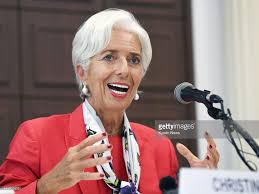The World Bank on Wednesday disclosed that Nigeria, South Africa, and Angola accounted for about 60 percent of Sub-Saharan Africa’s (SSA’s) Gross Domestic Product (GDP) in 2017.
Giving this hint at the ongoing IMF/World Bank Meetings in Washington DC, the Managing Director, International Monetary Fund (IMF), Christine Lagarde, said that growth outlook for Sub-Saharan Africa remained bright at 3.1 percent this year, indicating a marginally slower rate than it previously forecast but faster than last year based on rising commodity prices.
Lagarde stressed that by 2020 growth in the region should pick up to 3.7 percent.
The World Bank reported in its Africa’s Pulse report for April launched at the meeting that: “While Nigeria, South Africa, and Angola are expected to see a gradual pick-up in growth, economic expansion will continue at a solid pace in the West African Economic and Monetary Union (WAEMU), and strengthen in most of East Africa.
“These forecasts are predicated on the expectations that oil and metals prices will remain stable, expansion in global trade will stay robust, and external financial market conditions will continue to be supportive”, it added.
In January, the World Bank’s Global Economic Prospects report forecast growth in sub-Saharan Africa would rise to 3.2 percent in 2018.
The bank noted that Nigeria was experiencing a recovery in oil output, pointing out however that hurdles in non-oil industries and services will be a drag on activity.
“In Angola, the revisions reflect the expectation that a more efficient foreign exchange allocation system, increased the availability of foreign exchange due to higher oil prices, rising natural gas production, and improved business sentiment would help support the rebound in economic activity,” the bank stated.
Commenting during the launch the Africa’s Pulse today, World Bank’s Chief Economist, Africa, Albert Zeufack, said that though growth had rebounded in Africa, it was not enough as the continent was still far from the pre-crisis growth levels.
He said the growth forecasts were premised on expectations that the prices of oil and metals would remain stable, adding that the forecast was also based on expectation that governments in the region would implement reforms to address macroeconomic imbalances and boost investment.
Zeufack also said Africa must leverage on innovation to provide access to affordable and sustainable electricity.
He explained further: “African governments must speed up and deepen macroeconomic and structural reforms to achieve high and sustained levels of growth.
“By fully embracing technology and leveraging innovation, Africa can boost productivity across and within sectors, and accelerate growth”, Zeufack added.
It would be recalled that Sub-Saharan African economies were hit hard by a crash in commodity prices which slowed growth, slashed government revenues and weakened several of the currencies on the continent.
Growth was 1.5 percent in 2016, the lowest in more than two decades, before rising to an estimated 2.6 percent last year.






